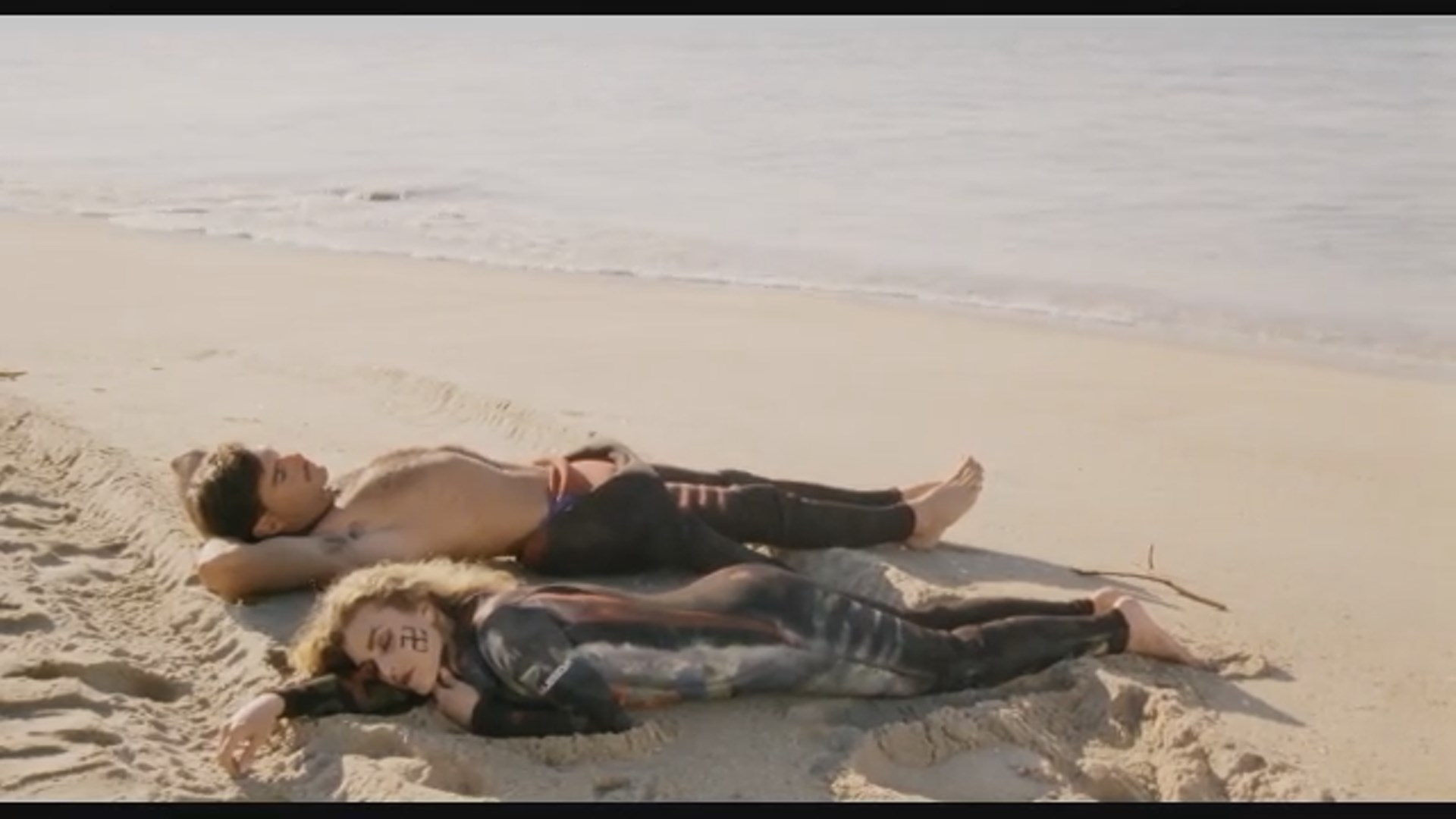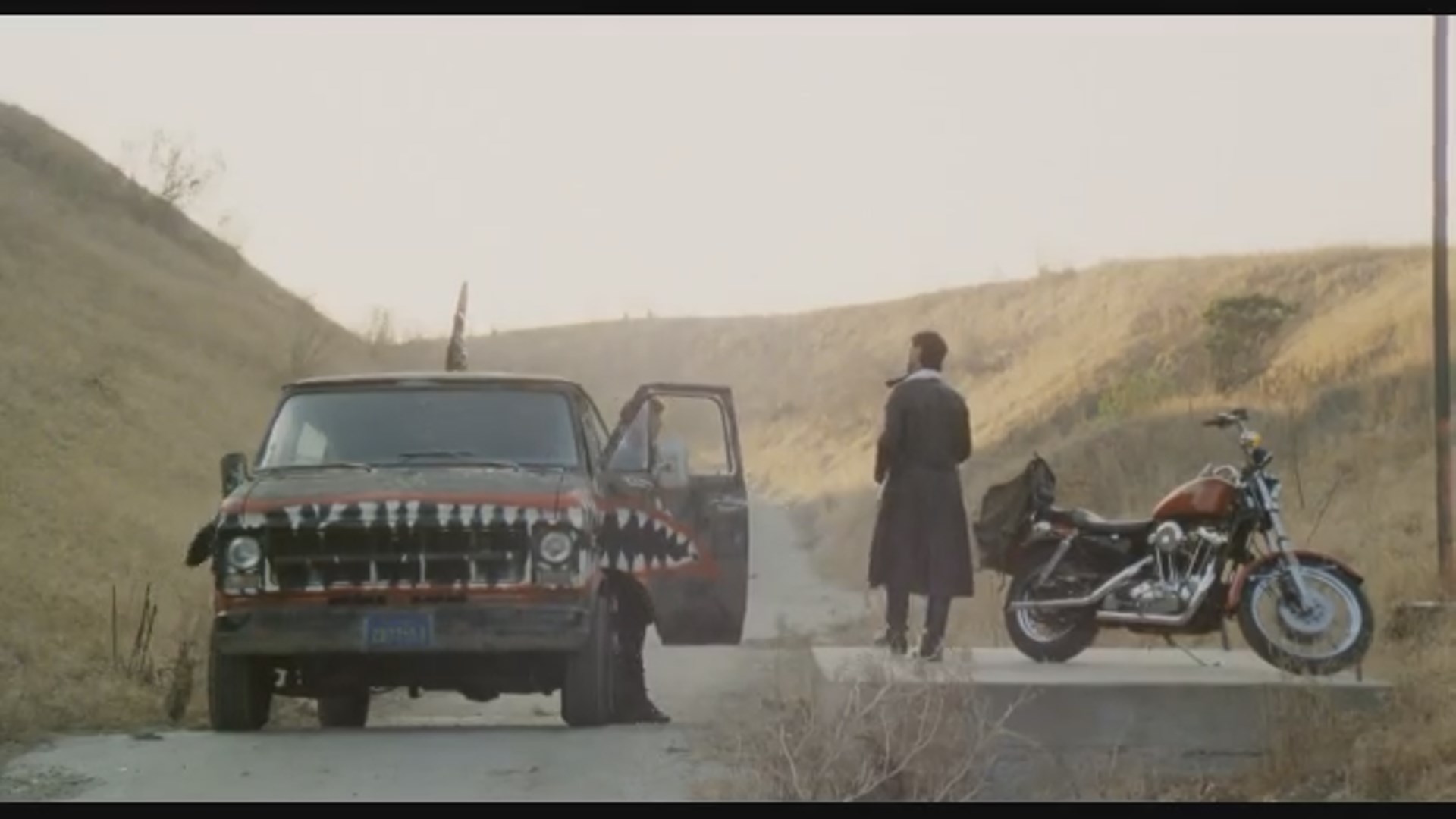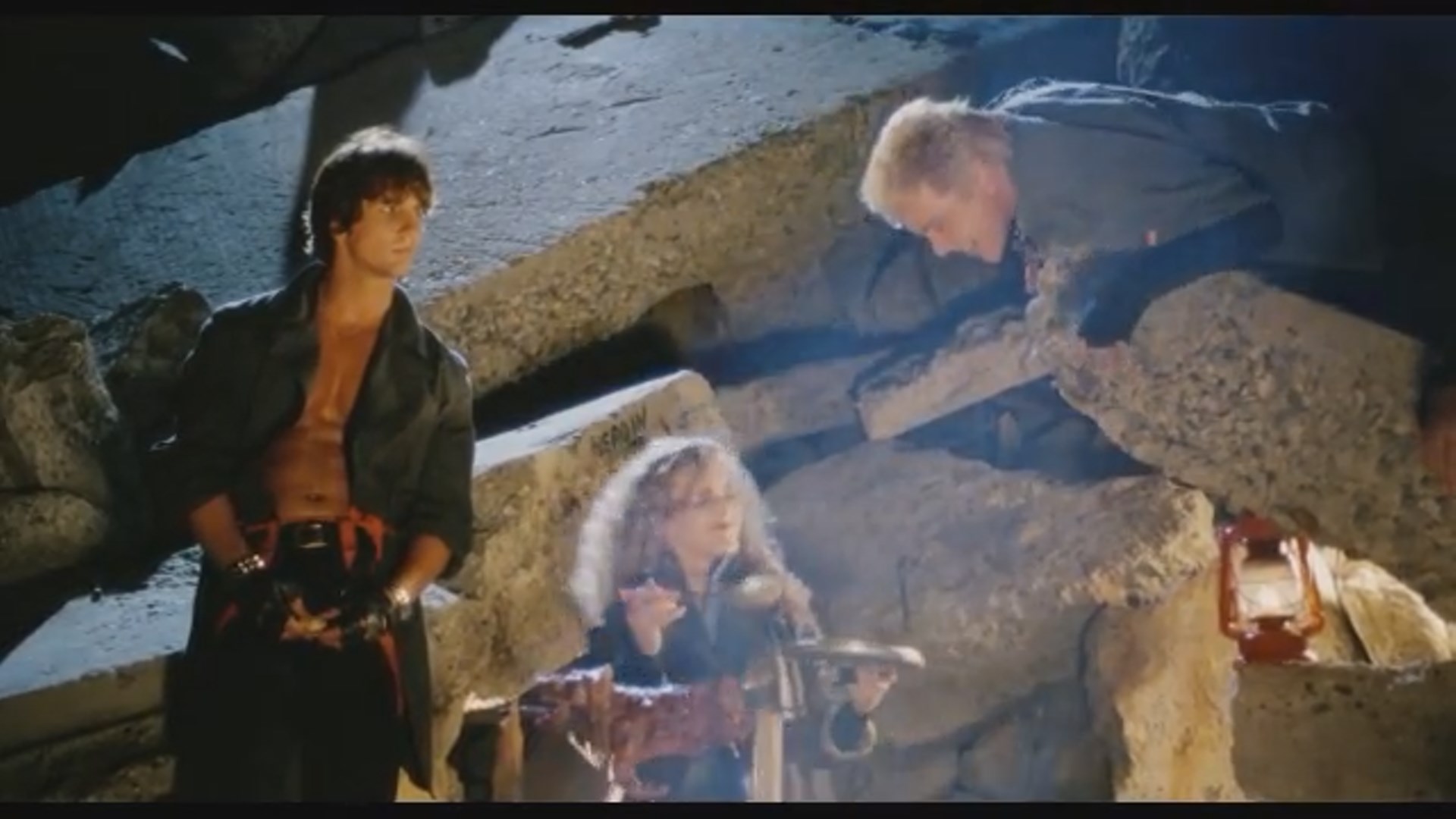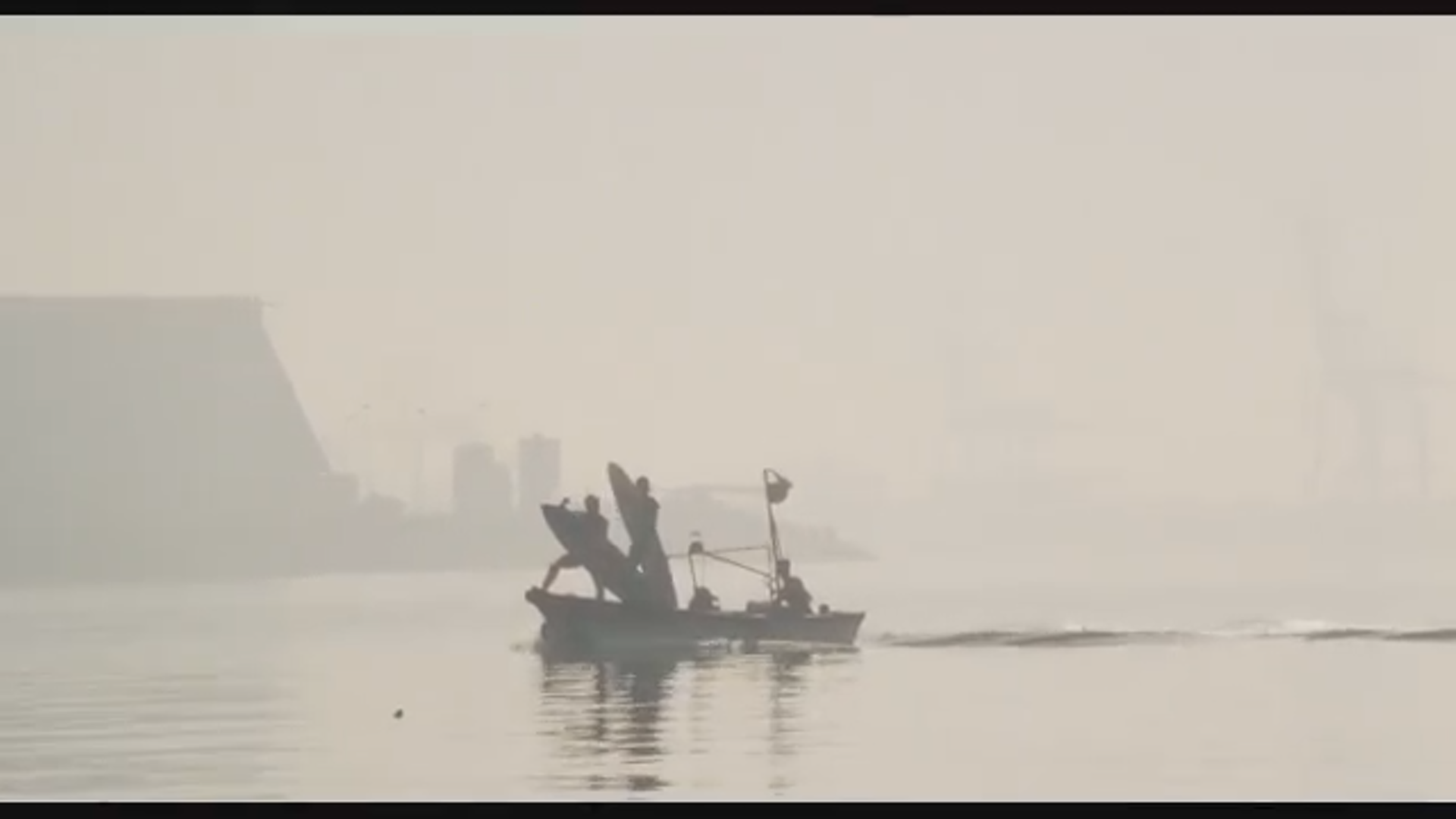Surf Nazis Must Die Is An Arthouse Film About How Fascism Is Quite Boring
31 10月 2024

When you see a 1987 movie called Surf Nazis Must Die, you might think it's a ridiculous exploitation movie. Who could imagine these people surfing the waves of California? That might get a few laughs from the audience, and that might be what the producers were going for.
But there were Surf Nazis back then. And in 2024, I think it's getting harder to laugh it off. Watching this movie as a joke for my partner and me became a riveting point of discussion: the filmmaking craft is spectacular, the script is bizarre yet points to things we've forgotten about fascism, and most importantly the fascists are just the most annoying and irritating people occupying the sands and waters of Mother Ocean.
According to a quote from Lloyd Kaufman's biography found in a Letterboxd review, the original title was just going to be Surf Nazis. But people might mistakenly assume from the title that they're the good guys, hence the violent addition of "must die". This creates misplaced expectations: it suggests to the audience that this is a revenge movie, which it is only in the last few minutes of the film.
Instead, it is this meditation on what it means to be a Surf Nazi. Most of the running time is devoted to a gang of Nazis invested in controlling Power Beach: we see them taunting and then murdering hippies who dare to surf in their place, stealing handbags from old ladies, hanging out in abandoned tunnels plastered with every curse word imaginable, and barbecuing a pig in a beach campfire. They do nothing but waste time, inconvenience beachgoers, and just surf.
There is no law and order to monitor and regulate their actions. The usual authority figures -- the police and father figures -- are gone. While the world seems to be getting along just fine, with the beaches being terrorized by the Surf Nazis and other gangs, there is a fear that this gang violence could spread even further.
Meanwhile, the movie occasionally cuts to the responsible Leroy Washington and his mama, Eleanor. Leroy works in an oil field near the beach, wears a nice shirt, and has sent his mother to the nursing home -- all perfectly middle-class things. Unlike the Surf Nazis, he seems to be the perfect average Black American who has his priorities all under control.
But Eleanor is not happy. She's very proud of her autonomy and rightly sees the nursing home she's been placed in as a prison. The caretakers try to sedate her independence, but she refuses to eat or touch her food and drink. There aren't many scenes that reveal her interiority, but her frown in the mirror suggests that she could be something more.
Indeed, it is his death halfway in that ties the two otherwise disparate plots together. He died for helping an old woman get her purse back from the Surf Nazis. The editing here is impressive: the audience sees him look at the camera, then a blurred vision of someone approaching from a doorway and it turns out to be his mother, then the Nazis crowding around him -- in a sense, he saw his death and his mother approaching at the same time. The connection between the Washingtons and the Surf Nazis is racially violent, and the editing is appropriately jarring for that reason.
Mama Washington, a devout Black Christian American with a Bible and American flags decorating her mirror, now wants revenge. She pops up in the movie from time to time, looking for clues and eventually a gun to hunt down these Surf Nazis. Her quest is purely patriotic and religious: she uses her Colt as a bookmark for her Bible.

While that sounds fucking awesome, she is just a supporting character who instigates the downfall of the Surf Nazis. The movie is a reversal of the expectations found in exploitation cinema: the Nazis are the protagonists, and the revenge-seeking mother is the monster of sorts -- or more precisely, a Columbo-like figure ready to pounce on the Nazis' mistakes.
And there are plenty: the movie is a character study of the Surf Nazis and the people who join them. Adolf is supposed to be the leader of the group, but he is unable to control the conflicting urges of Brutus and Hook, who are vying for control. He fools around, does nothing, yells, screams, and beats people up. He seems to aspire to Machiavellianism, but he lacks charisma to deliver speeches and control his group. All he can do is make people fear him. And Smeg, the young Nazi wannabe, is scolded by his mother, who has spoken to a psychiatrist and suggests that his interest in Nazism may be because his father is often absent and he is looking for a father figure. He even tries to approach some women before they tell him off for being part of the loser crew.
This vision of Nazi cosplayers who are disrespected in all walks of life and need to relieve their stress by committing random acts of violence is quite provocative to see today. While the movie is clearly a product of the liberal California imagination of the 1980s, where relegating Nazis to the beach is seen as necessary because it would be unrealistic to see them on the streets back then, there's something unsettling about how the film inadvertently predicts the colonization of basic aspects of everyday capitalist life by right-wingers. It suggests a pervasive psychology of insecurity, a desire to reassert a toxic form of masculinity, and a dismantling of the fragile peace for something more precise to their fascistic dreams.
There are many, many gorgeous shots in the movie that belong in an art house movie. Despite the cheesy costume design and awkward performances, the locations and shots emphasize the artificiality of it all. They seek the attention of the people inside and outside their group. The shots, the bored expressions and actions, and the noticeable lack of internal narration reveal their loneliness and emptiness. Even the spamming of the surfing shots does not make them look cool. They're just uncool, aimless, doing Nazi surfing for the sake of it.
The industrial soundtrack also brings out how they see the oppression of technology. While Leroy is attached to the oil pump, the Surf Nazis are more invested in sand (Adolf punctures a bag of sand to make his point that they are losing their living space) and nature. But this is a world that has already gone to the gutter: their retreat to the sand is not possible, nor is it compatible with their interest in bikes and other street subcultures. The music blares and creates moody scenes where they waste their lives and see no way to reclaim their lives from the contradictions of capitalism.

The Surf Nazis are always on the verge of devouring themselves. They may look cool to some people, but inside they suffer from ennui. They lack purpose: all they do is draw swastikas on their faces and act out their fascist fantasies, but this cosplay gives them no purpose -- only violence. This is why they are so pathetic throughout the movie.
However, they have strength in numbers and skill. They are able to subdue the other gangs that try to fight them. People fear them. Bodies litter the beaches. Their display of iconography and violence attracts younger people -- perhaps their power suggests they know what they are doing. Even if their ideology is a farce, they seem to have some control, and they represent an alternative entity to most of the adults in the film: what do the old fishermen and timid merchants have to offer when the Surf Nazis look like they're in control?
If the "must die" wasn't part of the movie's title, I suspect people would see the movie for what it is: an honest attempt to paint a portrait of people drawn to fascist gangs. This movie hits you differently when you see it in 2024: it may be a caricature of fascists, but it brings up the traits of fascism that are often ignored in the mainstream media right now. The Surf Nazis are not presented as people who can be reasoned with; their incessant lust for control and violence is not to be scoffed at. The only logical answer is antifascism.
Eleanor's anti-fascism is shaped by the death of her son. It empowers her to break free from all forms of authoritarian control, including the old folks' home, so that she can wreak havoc on the Surf Nazis.
But the movie is also subtle about the state of society and what she can do after her onslaught. The reason the United States could allow the proliferation of these youth gangs is because it has fallen into disrepair. No more Tough on Crime America, it's cartoony anarchy that is also surprisingly acceptable and peaceful for the status quo considering how damaging the apocalypse should be. There seems to be no future for someone as independent as her.
And yet, at the end of the film, she rides the motorcycle left behind by the Surf Nazis and laughs because she is free. The post-apocalyptic vision is chaotic, but it also suggests promise. Not surprisingly, many critics wish there was another movie in the footsteps of Eleanor "Mama" Washington: she seems full of life and vibrancy, unlike the dull and mediocre Surf Nazis. There's a movie waiting to be made with her character.
Her violence, unlike that of the Surf Nazis, has purpose. She recognizes the rotten tendencies of fascism and the only way to stop it is to kill it. Mama Washington, though she only appears for a few minutes, has so much energy that the languid pacing disappears and the movie cannot contain her at all. She is a role model: a hero who guns down fascists and loves life.

So despite the silly movie title and the saccharine liberal ideological underpinnings, there is a very provocative leftist anti-fascist reading to be excavated.
In the Horror Vanguard bonus episode #155 on the film, the co-hosts take a page from Alain Badiou: the old and the young (in their reading, the other gangs) will be the ones to form a revolutionary alliance. While they find the film unsatisfying (they see it as two exploitation films that fail to cohere), the messages it offers are worth chewing on.
My partner and I see it as a form of exploitative slow cinema that considers the fascist youth subcultures of its heyday seriously. The mystique of fascism is exposed as utterly boring, and there is some deep reflection on the psychology of these fascist wannabes. And it also points to antifascism as the true affirmation of life and freedom.
Surf Nazis Must Die is not a perfect movie, but it is far more entertaining and thought-provoking than critics and moviegoers give it credit for. The pacing allows for a lot of reflection on how boring the Surf Nazi experience actually is, the editing is sensitive to the atmospheric shots and dark music, and the sporadic nonsensical violence is terrifying when it happens.
I cannot think of another movie like it. It provides an unusual cinematic space for reflection on the mundane spectacle of fascistic violence. There are movies that are definitely more insightful, but its bizarre subject matter allows a new angle that I just never thought of. It shows that youth fascism is boring, lonely, and pathetic, despite the appeal of flashy iconography and macho performances.
It is a melancholic film that makes me meditate on how lifeless fascism really is, and I certainly want more people to see it and be impressed by what it evokes in today's political world.